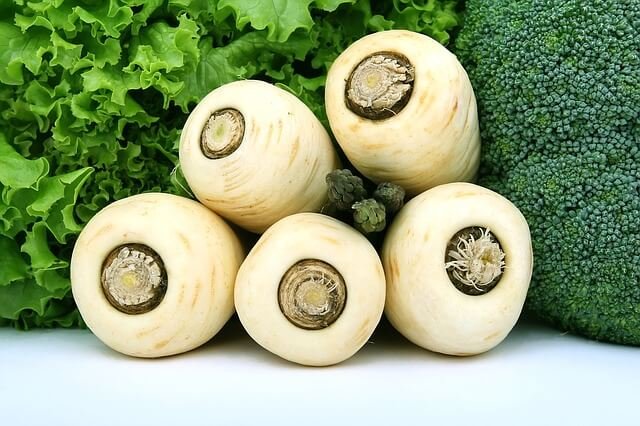Table of Contents
Parsnip is a rarely recognized root vegetable with a copious amount of nutrients. It closely relates to the carrot family.
This mouth-watering vegetable ages back thousands of years. People from all over the world have loved it since the Roman era. It has long, cream-colored roots and a quirky flavor. They grow underground and possess vital nutrients.
Parsnips belong to the Apiaceae family. They complete their biological cycle in two years. They are almost similar to carrots.
Parsnips possess various flavors, including sweet, starchy, and bitter. They have essential vitamins, folate, and antioxidants, making them a nourishing food item.
Parsnips can be roasted, boiled, or even sauteed. Many people eat roasted parsnips with mashed potatoes on thanksgiving in various countries. They add flavor to various dishes and make them crunchy and quirky.
Are parsnips good for diabetics?
Parsnip is an appetizing vegetable. But are parsnips good for diabetics?
Foods that are rich in fiber are proven to be suitable for people diagnosed with diabetes. A single cup of parsnips contains 24 grams of carbohydrates and 7 grams of fiber. Parsnips are known to be high in vitamin C, vitamin K, fiber, macronutrients.
Unlike what people think, consuming parsnips does not raise blood sugar levels because it has little to no sugar. Because of the highly soluble fiber content, parsnips help lower cholesterol and regulate blood sugar.
Diabetics don’t need to avoid eating food rich in carbs. Carbs are essential for the body and provide energy. However, they must dissociate themselves from added sugar and canned food.
All these factors make parsnips a healthy vegetable for people diagnosed with diabetes.
6 Benefits Of Parsnips For Diabetics
Parsnip is a vegetable with significant health benefits for both diabetics and non-diabetics.
Some benefits of parsnips for diabetics are-
1- Rich in nutrients
Parsnips are packed with various essential nutrients that are vital for the human body. They are rich in fiber, Vitamins, macronutrients, minerals, and folate. A cup of parsnips contains 100 calories and 7 grams of fiber.
They are good sources of vitamin C and vitamin K. Surprisingly, and they can also reduce stress.
2- Supply Antioxidants
Antioxidants are compounds that help in reducing stress. Parsnips are rich in antioxidants and hence prevent chronic diseases. Parsnips minimize the risk of cancer, diabetes, and heart problems.
They have copious amounts of ascorbic acid and polyacetylenes. Hence, parsnips reduce oxidative stress and reduce the risk of various diseases.
3- Helps in weight loss
Parsnips are low in calories but rich in fiber. This makes them a healthy meal for someone looking to lose weight. Increasing the fiber intake automatically reduces the number of calories you intake.

One cup of parsnips contains 100 calories but also 7 grams of fiber at the same time. This balanced proportion of nutrients leads to weight loss. Parsnips are also high in water content. Studies prove that consuming food items rich in water content help reduce excess weight.
4- Reduces the risk of type-2 diabetes
It has been proved that fiber-rich food can directly reduce the risk of type-2 diabetes. Parsnips are rich in soluble fiber. 133 grams of parsnips contain 7 grams of fiber. This helps in lowering cholesterol and regulating glucose levels. Thus, parsnips reduce the risk of type-2 diabetes.
5- Lowers the risk of cancer
Parsnips reduce the risk of ovarian cancer and help patients with colon cancer. They contain folate (vitamin B9), which lowers cancer risk in women who indulge in alcohol.
They also possess the ability to destroy colon cancer cells and keep the body healthy.
6- Strengthens the immune system
As we have discussed above, parsnips have several health benefits. They can prevent and cure a variety of diseases. Hence, they help strengthen the immune system. They also possess falcarindiol (FAD), which helps to regulate the immune response.
Also, parsnips possess quercetin, apigenin, and kaempferol, enhancing immunity and preventing infections.
FAQs
Are parsnips high in sugar?
Parsnips are packed with necessary nutrients and have several health benefits. They are rich in vitamin C, antioxidants, fiber, and several other micronutrients. Parsnips are not high in sugar. Instead, they are a great source of carbohydrates that increase your vitality.
Are parsnips and turnips good for diabetics?
Root vegetables such as turnips and parsnips are good for diabetics because of the high fiber and nutrition they possess. Both these vegetables grow under the soil and possess the necessary vitamins and minerals.
What is the glycemic index of parsnips?
Parsnips have a glycemic index of 52. But it is not mandatory for food items with a high glycemic index to be unhealthy. Parsnips have a comparatively high glycemic index, but they have no sugar and are healthy to eat.
Can type 2 diabetics eat parsnips?
It is a proven fact that there are a lot of benefits of parsnips for diabetes. Food items like parsnips that are rich in fiber often reduce the risk of type 2 diabetes and regulate your blood sugar levels.
Do parsnips raise blood sugar?
Parsnips do not raise blood sugar levels. Instead, they have several health benefits, including weight loss and balancing glucose levels. Parsnips are rich in carbohydrates and provide energy, but they do not contribute to spiking your insulin levels.
Conclusion
Parsnips are nutritious root vegetables similar to carrots.
They are a good source of several nutrients and micronutrients. They have low sugar levels and provide essential carbohydrates, fiber, vitamin C, and vitamin K. They have a glycemic index of 52. If you wonder if parsnips are good for diabetics, there is no need to worry.
Parsnips supply antioxidants and help in weight loss. They are also helpful in reducing the risk of cancer. They often lower the chances of type 2 diabetes and provide numerous health benefits.
Some other benefits of parsnips include strengthening the immune system and stabilizing glucose levels. Moreover, they are easy to cook and delicious. Overall, it is a highly advantageous vegetable.
